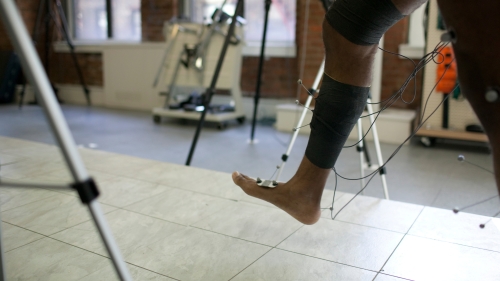The assistant professor of physical therapy analyzed pain intensity, how pain interferes with function, and number of pain sites for Black and Hispanic patients following bariatric surgery.

Getty images/Portra
Surgical weight loss reduces pain in Black and Hispanic patients, yielding the greatest benefit for pain reduction within the first three months after surgery and decreasing pain faster among Hispanic patients in the early phases of weight loss, finds a new study. However, despite Black and Hispanic patients having significantly less pain after bariatric surgery, their pain burden is still much higher than the general population.
“Medical providers and researchers tend to underestimate the burden of widespread pain in minoritized populations living with higher body weight, leading to widening disparities and poor management of the symptoms,” says lead author Ericka N. Merriwether, an assistant professor of physical therapy at NYU Steinhardt School of Culture, Education, and Human Development
Merriwether and her co-authors’ findings are published in The Journal of Pain.
Analyzing data for 256 patients who received a sleeve gastrectomy (a bariatric procedure in which a large portion of the stomach is removed) between 2017 and 2020, researchers looked at differences by racial group in weight loss and pain trajectories three months, one year, and two years after surgery. Pain was evaluated in terms of intensity, interference (how pain affects functioning), and the number and location of painful sites on the body.
Among the findings, widespread pain burden improved, but remained higher than the general U.S. population estimates. Higher percentages of total weight loss were linked to lower pain intensity and lower pain interference following surgery. The greatest reduction in pain intensity and interference occurred in the first three months after surgery, with the impact leveling off after the first year.
In a comparison of the two groups, Hispanic patients reported a higher number of pain sites before surgery and experienced a faster rate of reduction in the number of pain sites after surgery. Black and Hispanic patients experienced greater widespread pain burdens at different intervals following surgery, but there were no statistically significant differences in pain intensity or interference.
The researchers also found that the lower back, legs, and feet were the most frequent pain sites, with the lower back reported the most throughout the observation period.
“Patients who live with chronic pain are often told that their pain will improve if they lose weight,” says Merriwether. “This work suggests that there may be pain improvement in the early stages of weight loss that either doesn’t improve any further or may regress in instances of weight regain. Our findings also suggest that Black adults with widespread pain are not experiencing the same levels of improvement, despite losing a lot of weight. We recommend that healthcare providers use simple tools such as a body diagram to see patterns of widespread pain as part of the standard of care for pain and weight management.”
The research was supported by the National Institute of Arthritis and Musculoskeletal and Skin Diseases (K23AR080846); the National Institute of Neurological Disorders and Stroke (UG3NS135170 and R01NS129887); the National Heart, Lung, and Blood Institute (2T32HL098129 and K24HL165161-01A1); the National Library of Medicine (5R01LM014085); and the J. Ira & Nicki Harris Family Foundation.
Press Contact
(646) 469-8496
Related Articles
The Center of Health and Rehabilitation Research 2024 Spring Showcase Highlights Faculty and Student Research
Attendees saw presentations from across the rehabilitation fields in multiple academic departments and heard from CoHRR and Seed Award grantees.
DPT Alum Helps Professional Athletes Go for Gold
Sharif Tabbah (DPT ’12) co-owns and leads Alkemē Sports RX in Florida, focused on athletic recovery and performance.
Studying Stigma: A Conversation with Assistant Professor of Physical Therapy Ericka Merriwether on Chronic Pain, Obesity, and Discrimination
We sat down with Dr. Merriwether to discuss part of her research that examines relationships between chronic pain and race- and weight-based discrimination.
Related Department

Physical Therapy
380 Second Avenue, Fourth Floor
New York, NY 10010
Phone: 212-998-9400
Email: steinhardt.pt@nyu.edu



